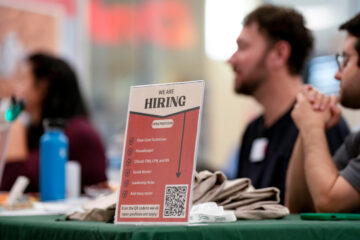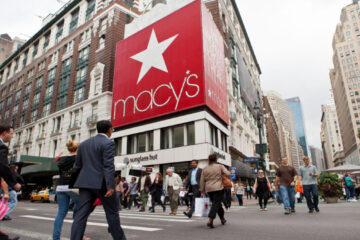What kind of Mickey Mouse outfit is this?
Actually, Disney (DIS) is the original Mickey Mouse outfit, and the world-renowned rodent has been taking a bit of a drubbing lately.
💵💰Don’t miss the move: Subscribe to TheStreet’s free daily newsletter 💰
The entertainment giant’s live-action remake of “Snow White,” for example, has been the source of much misery, including mixed reviews and complaints from some circles about a Latina actress in the lead role, as well as the portrayal of the Seven Dwarfs.
The disappointing results prompted Disney to indefinitely pause development of a live-action “Tangled” movie, a reimagining of the 2010 animated film
“The Greatest Showman” director Michael Gracey and Jennifer Kaytin Robinson, who wrote “Thor: Love and Thunder,” were both attached to the project.
Disney shares are down nearly 24% since January and off 25% from a year ago.
Walt Disney CEO Bob Iger rings the opening bell at the NYSE on Nov.27, 2017, marking the company’s 60th anniversary as a listed company. The stock is down in 2025.
Leisure activities hurt by weaker spending: professor
Alice Kassens, professor of economics and director of the Center for Economic Freedom at Roanoke College, told Quartz last month that the broad-market stock selloff appeared to have stemmed from concern about consumer spending.
She added that consumer worries over prices were showing up in weakened consumer sentiment. “This measure is important because it is an indicator of current and future consumer spending, which makes up 70% of total spending in the economy,” Kassens said.
More Experts
Stanley Druckenmiller sends curt 7-word response to tariff warJim Cramer delivers blunt take on tariffs after stocks crashScott Galloway sends strong message on Social SecuritySuze Orman sends strong message on 401(k)s, recession
She noted that vacations and travel would likely take a hit since those are easier to pull back on than food or necessities.
Consumer confidence has been on a downswing, falling 11% in April to a preliminary reading of 50.8, according to the University of Michigan’s consumer sentiment index. That was down nearly 7 points from March and was the second-lowest reading on records going back to 1952.
Joanne Hsu, the survey’s director, said the decline was “like the last month’s, pervasive and unanimous across age, income, education, geographic region and political affiliation.”
“Sentiment has now lost more than 30% since December 2024 amid growing worries about trade war developments that have oscillated over the course of the year,” she said.
TheStreet Pro trader: double whammy for consumers
James “Rev Shark” DePorre said that the tariff issue was certain to create uncertainty and turmoil, “but what has made it far worse is that it is hitting at the same time that the economic cycle is turning down.”
“Some economists say that the economy is already exhibiting recessionary tendencies, and tariffs are accelerating what would have already occurred,” he said in his recent TheStreet Pro column. “Economic pessimism is building and consumer expectations are falling as worries about inflation rise.”
Related: Walt Disney CEO shares massive changes to billion-dollar service
Disney, which is scheduled to report fiscal-second-quarter results on May 7, beat Wall Street’s first-quarter earnings forecasts in February, despite a 1% decline in subscribers for its streaming video service, Disney+.
The company warned that it expected another “modest decline” in subscribers during Q2.
Disney posted revenue gains across the board for its entertainment, sports and experience segments.
Analysts focus on economic impact on Disney
Investment firms have been focusing on the economy’s impact on Disney in recent research reports.
Earlier this month, Morgan Stanley named Netflix (NFLX) as new Top Pick in media and entertainment, giving Disney the boot. Applying “a more defensive lens to our [media and entertainment] coverage leaves us incrementally bullish on Netflix,” MS said.
The investment firm said that it expected Netflix to demonstrate relative resilience in a weaker global macroeconomic backdrop, arguing that momentum in its core subscription business, combined with recent weakness in the U.S. dollar, should derisk fiscal 2025 estimates, even in a softer ad market.
The firm has an overweight rating and $1,150 price target on Netflix shares.
Related: Analyst reboots Netflix price target ahead of earnings
On April 15 UBS lowered its price target on Disney to $105 from $130 and affirmed a buy rating on the shares, according to The Fly.
Given the current macroeconomic uncertainty, the firm is updating forecasts across Disney’s most sensitive revenue streams, including advertising and theme parks.
UBS said, however, that the company’s second-quarter results would reflect resilient demand, and the investment firm still expected earnings-per-share guidance to be intact given a solid performance year-to-date.
Barclays analyst Kannan Venkateshwar recently cut the firm’s price target on Disney to $115 from $125 and maintained an overweight rating on the shares as part of a preview for the media group.
While the Barclays analyst expects stable spot advertising rates, macroeconomic headwinds might not yet be fully reflected in estimates, the analyst tells investors in a research note.
Related: Veteran fund manager who forecast S&P 500 crash unveils surprising update


